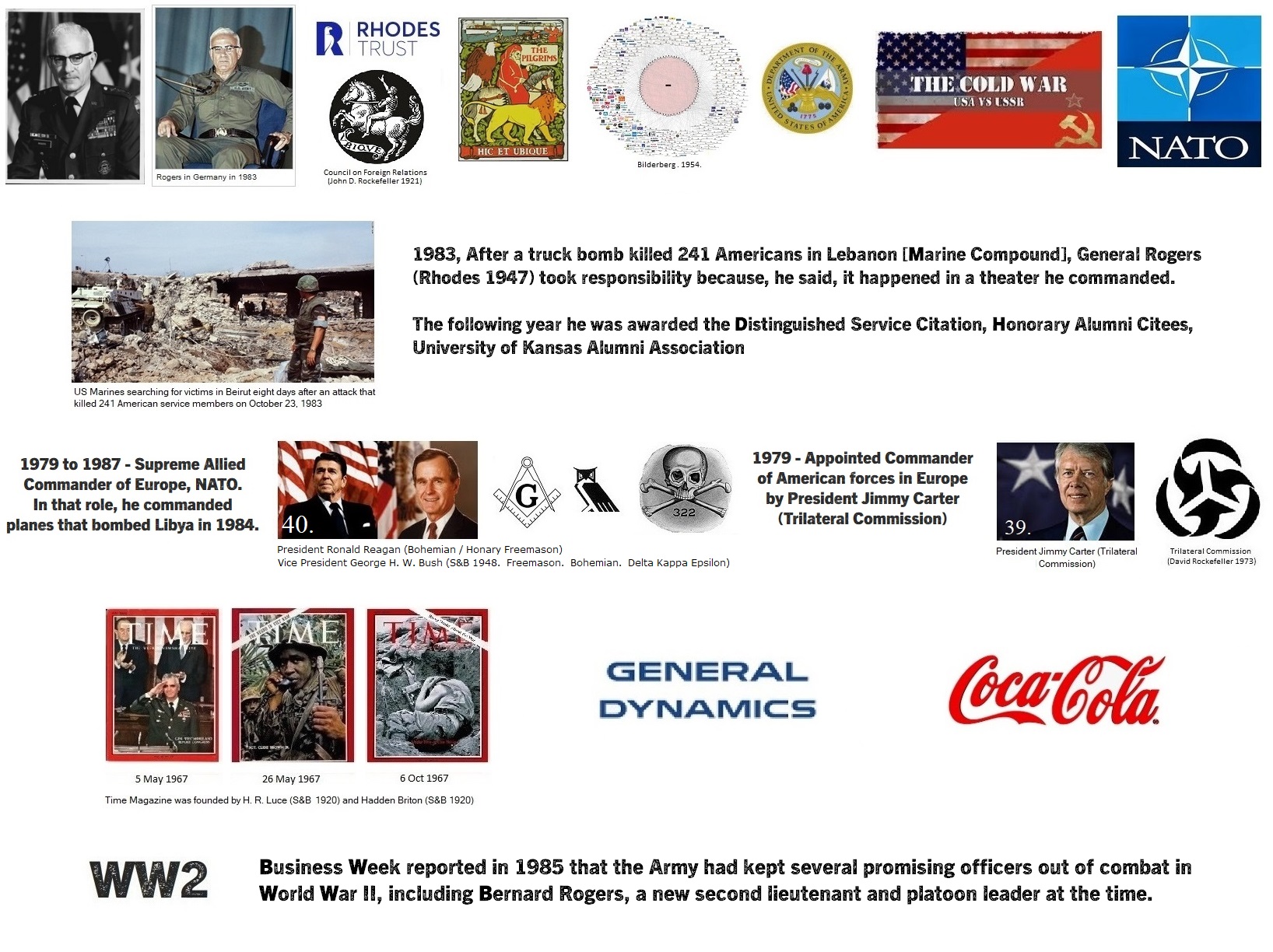
Bernard William Rogers (Rhodes 1947)
Kansas State University. Phi Delta Theta Fraternity. Rhodes Scholar, University of Oxford. Council on Foreign Relations[7].
Member of the Pilgrims Society of the United States.[6]
Consultant and Director to several companies including Coca Cola and General Dynamics.[7]
Gen. Bernard W. Rogers [Rhodes 1947], the intellectual and opinionated former chief of staff of the United States Army and commander of NATO who developed strategies to help his service adjust to an all-volunteer force and new generations of weapons.[3]
His unconventionality culminated in his criticizing the Reagan administration as moving too rapidly toward an arms control agreement with the Soviet Union on intermediate-range missiles in 1987. He said in interviews with The Washington Post and other news organizations that White House officials were racing to get a deal before leaving office.[3] General Rogers had already said in an interview with The New York Times in 1986 that the scale of arms reductions the Americans and Russians were discussing gave him “gas pains.” He argued that shorter-range nuclear missiles were necessary to deter a Russian ground attack on Western Europe.[3] The United States and the Soviet Union signed the Intermediate-Range Nuclear Forces Treaty in December 1987, and the Senate ratified it in May 1988.[3]
1999 - George C. Marshall Medal, United States Army Association [1,13]
1995 - Distinguished Graduate Award, USMA Association of Graduates [1,3]
1985 - H.H. Arnold Award, Air Force Association[1,12]
1984 - Distinguished Service Citation, Honorary Alumni Citees, University of Kansas Alumni Association[1,2]
1983, After a truck bomb killed 241 Americans in Lebanon [Marine Compound] in 1983, General Rogers took responsibility because, he said, it happened in a theater he commanded.**
1981 to 1985, Attended Bilderberg.**
1979 to 1987 - Supreme Allied Commander of Europe, NATO. In that role, he commanded planes that bombed Libya in 1984.3
1979 - Appointed Commander of American forces in Europe by President Jimmy Carter (Trilateral Commission).[3]
1976, General Rogers was embarrassed by news reports that he had sent his golf shoes from Georgia to Kansas on an otherwise empty military plane. He transferred the underlings he said were responsible, and paid the $931.60 cost of the flight.[3]
1976 to 1979 - Army Chief of Staff
1975 to 1976 - Commanding General, U.S. Army Forces Command
1974, Earned his fourth star.[4] Promoted to temporary general and commanded the U. S. Forces Command at Fort McPherson.[5]
1972 to 1974 - Army Deputy Chief of Staff for Personnel.[5]
1969 to 1970 - Commanding General of 5th Infantry Division [Ft. Carson, Colorado] It was while serving as commander of the Fifth Infantry Division (Mechanized) at Fort Carson, Colorado, in 1969 that Rogers gained attention for his reform program to make army training more meaningful for the common soldier and improve communication between officers and enlisted personnel. He eliminated KP duties, early morning formations, and roll calls, and “G.I. parties” to scrub barracks for Saturday inspection. He established councils for junior officers and for enlisted personnel to air grievances and encourage suggestions, and worked toward resolution of race and drug problems on base. His liberal innovations were credited with stimulating substantial reenlistments at Fort Carson.[5]
1967 to 1969 - Commandant of Cadets at U.S. Military Academy, West Point.[3]
December 1966, the Army helicopter set down at Quan Loi, the First Infantry Division’s outpost just 15 miles from the Cambodian border. The division’s assistant commander stepped out to begin his tour of inspection and for two-and-one-half hours, the general circulated among the men, interviewing officers and sergeants, but especially privates, his most often asked question: “Is there anything I can do, for you?” Rogers’ concern for the welfare of the common soldier was a hallmark of his career.
1966 to 1967 - Assistant Division Commander of 1st Infantry Division [South Vietnam]. Where he led a heralded counterattack against the Viet Cong and won the Distinguished Service Cross, the second highest decoration in the Army. He also received his first general’s star.[3]
1962 to 1966 - Executive officer the chaitrman of the Joint Chiefs of Staff.[3]
Rogers graduated from the Command and General Staff College at Fort Leavenworth and commanded the First Battalion, 23rd Infantry from 1955 to 1956, then as senior aide to the army chief of staff from 1958 to 1959.[5]
1953 to 1954 - Aide to the commander in chief and staff intelligence office of the United Nations and Far East Commands.[5]
Korean War, 1949 - promoted to captain and led the Third Battalion, Ninth Infantry, in the Korean War.[5]
1947, Rhodes Scholar, University College, University of Oxford.1
Served as chief aide to Gen. Mark W. Clark, commander of American troops in Austria.
Following WW2, he taught economics, government, and history at West Point.[5]
WW2 - Business Week reported in 1985 that the Army had kept several promising officers out of combat in World War II, including Bernard Rogers, a new second lieutenant and platoon leader at the time.[3]
1940 - United States Military Academy at West Point. First Captain of Cadets.[3]
Died 27 Oct 2008, from Not Known. Age 87.
[1,13] - 1999 - George C. Marshall Medal, United States Army Association
[1,3] - 1995 - Distinguished Graduate Award, USMA Association of Graduates
[1,12] - 1985 - H.H. Arnold Award, Air Force Association
[2] - FYI - Wiki - Bernard William Rogers (Rhodes 1947)
[4] - CNN, 13 Jun 2013 - Beirut Marine Barracks Bombing Fast Facts
[5] - Kansapedia , Kansas Historical Society - Bernard William Rogers
[6] - State Jan 1981 by U.S.Department of State.



Comments